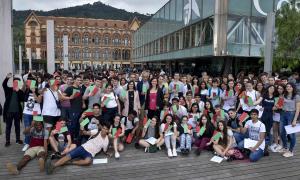400 high school students present a new participatory method to prevent sexually transmitted infections and the stigma associated with HIV

Co-ResponsiVIHlity project gathers more than 400 students fromt 13 educational centers in Catalonia to present the results of three participatory R&I projects where they have discussed stigma, access to HIV testing and affective-sexual education to promote prevention, research and open and inclusive innovation
Would the effectiveness of prevention interventions for sexually transmitted diseases improve if they were developed using more participatory methodologies? Is it easy for teenagers to access to HIV testing? Are young people aware of the stigma associated with sexually transmitted infections? More than 450 students and teachers from 13 secondary schools in Catalonia have participated throughout this academic year in three participatory research and innovation (R&I) projects, in which they have worked on these issues through innovative methodologies to promote prevention, research and open and inclusive innovation, in collaboration with researchers and other stakeholders. The results of the projects, which revolve around stigma, access to HIV testing and affective-sexual education, have been presented and discussed today at CosmoCaixa at the final conference of the Co-ResponsiVIHlity project, which is coordinated by the Living Lab for Health of IrsiCaixa.
“The conference compiles the results and conclusions of the participatory R&I projects that have allowed the promotion of prevention with methodologies more aligned with the needs of young people and at the same time promote the empowerment of the educational community and the other stakeholders with competences to participate in R&I. These competences are key to achieve legitimate research and reverse the European paradox that leads us to publish a lot but little innovate”, according to Rosina Malagrida, project coordinator and Head of the Living Lab for Heath of IrsiCaixa.
One of the conclusions obtained by the students is that people are not aware of the HIV stigma until they spend time reflecting on it. The students therefore make a call for better reflection and education to improve the prevention of STIs and the associated stigma.
During the congress, participants have discussed the learning process, knowledge and skills they have acquired during the R&I projects, the potential impact their project will have and the future lines of action. In addition, SIDASTUDI and CJAS have explained their work for the prevention of HIV among young people.
Co-ResponsHIVility is carried out within the Xplore Health, EnRRICH and INSPIRES projects, with the collaboration of the VU University of Amsterdam, the Center for Epidemiological Studies on Sexually Transmitted Infections and AIDS of Catalonia (CEEISCAT), the Pompeu Fabra University and the entities of the civil society SIDASTUDI, Youth Center of Attention to Sexualities (CJAS) and the Working Group on HIV Treatments (gTt-HIV). The congress has been inaugurated by the director of IrsiCaixa, Bonaventura Clotet, and by the Deputy General Director of “la Caixa” Banking Foundation, Elisa Durán. The director of R&I of the Ministry of Health of Catalonia, Albert Barberà, and the general sub-director of Innovation, Training and Orientation of the Ministry of Education of Catalonia, Àngel Domingo, have also participated.